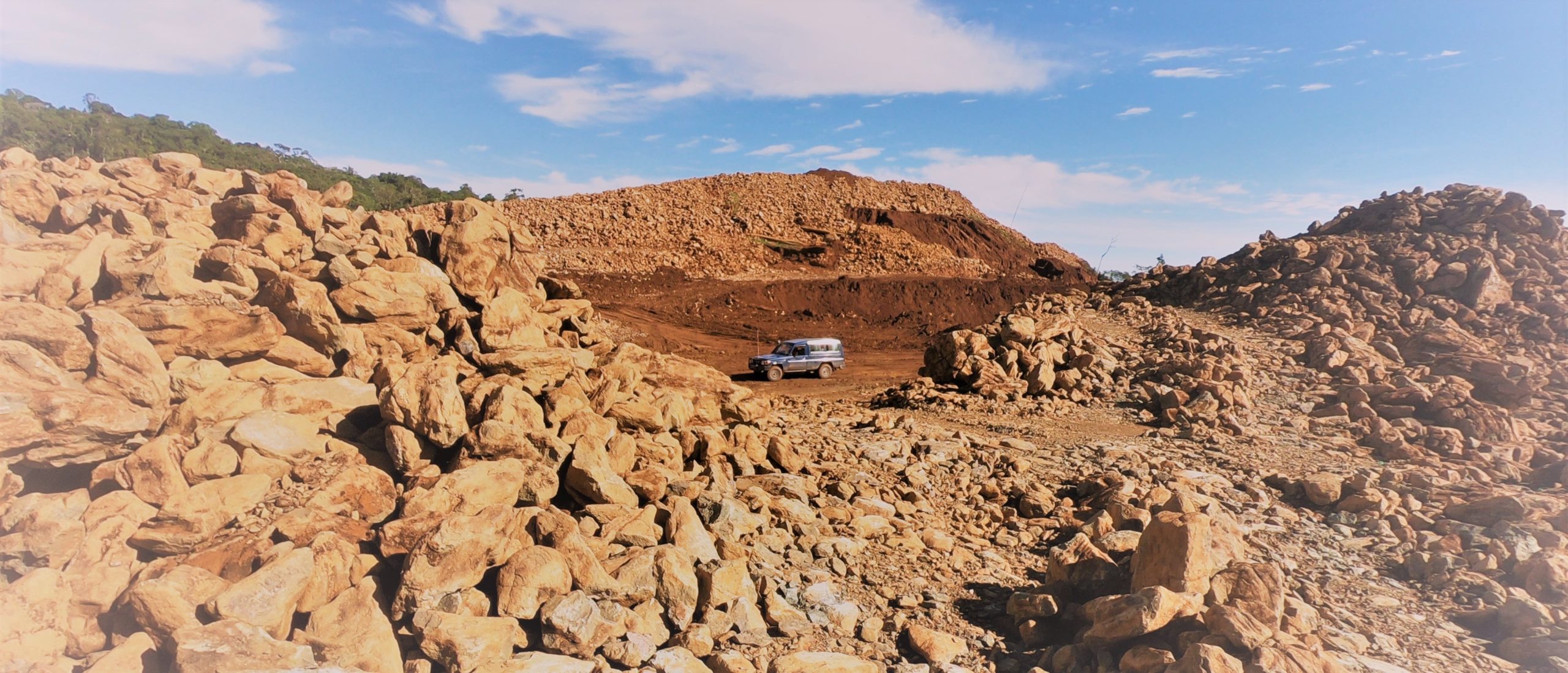
Activities
This site provides information on project activities – including research and deliverables milestones, as well as outreach and dissemination activities.
OHCHR Dialogue for a Just Transition
On 14 December 2024, JTPac’s Emilka Skrzypek was invited to take part in the Dialogue for a Just Transition: Pacific Perspectives on the Energy Sector, and Beyond.
The event was organised by the OHCHR Regional Office for the Pacific and the UN Special Rapporteur on the right to development, and created a critical and inclusive space for tacking questions such as: How do we make sure that the energy transition is just? And what does this mean? How do we encourage responsible business conduct, and climate-conscious planning – whilst upholding and promoting human rights? What are the feedback loops between extractivism, energy, and climate change – and how are those experienced, and managed, in the Pacific?
Emilka was joined on the expert panel by Vani Catanasiga, Faye Strachan, Gillian Cambers and Howard Politini.
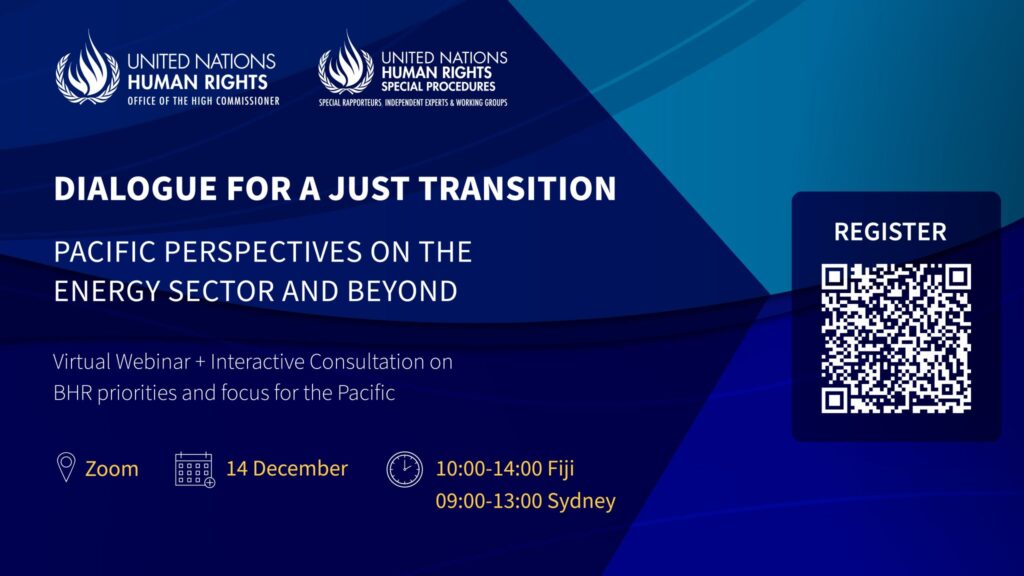
Mining Encounters Conference – August 2023
On 22-23 August 2023, JTPac’s Nick Bainton and John Burton zoomed into a two-day seminar on mining issues with researchers from Canada, Australia and New Caledonia. It was a great opportunity to hear from other colleagues working on Energy Transitions and Critical Minerals, and to present our work on ‘double exposure’ to climate change and extractive capitalism in the Pacific.
The event was co organized by the Knowledge Network Mining Encounters and Indigenous Sustainable Livelihoods Cross Perspectives from the Circumpolar North and Melanesia/Australia MinErAL, the Sustainable Minerals Institute, the Pacific Centre for Social Responsibility and Natural Resources, and the Centre National de Recherche Technologique (CNRT).
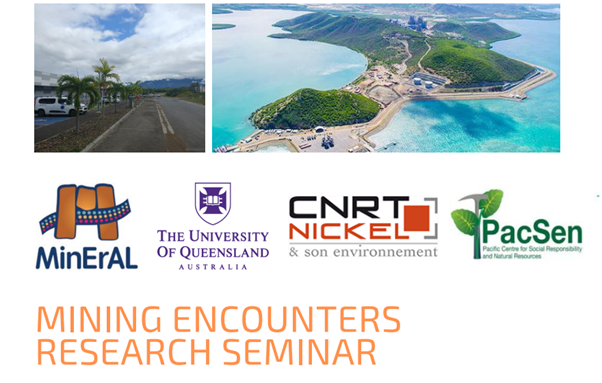
The Pacific Centre for Social Responsibility and Natural Resources workshop – July 2023
On 10th July, JTPac’s Nick Bainton, Emilka Skrzypek and Pierre-Yves Le Meur a PACSEN network workshop at the University of South Pacific in the Cook Islands. PACSEN is a research network created to contribute to the development of integrated, responsible and sustainable management of natural resources in the Pacific. The workshop brought together researchers, civil society and government representatives in a discussion around seabed mining prospects in the Cook Islands
Seabed mineral exploration began in the Cook Islands’ EEZ in the 1960s, and by the 1970s surveys revealed significant resources of polymetallic nodules. These nodules are so rich in four essential metals needed for building batteries (cobalt, nickel, copper and manganese) that they are often called ‘a battery in a rock’.Currently, three companies are conducting seabed mining exploration in Cook Island’s waters. Their activities are overseen by the Cook Islands Seabed Mining Authority – a government unit specifically focused on seabed minerals and mining.
Participants offered different perspectives on opportunities but also concerns related to this form of development in the Cook Islands, as wider Pacific, in a discussion that focused on issues such as governance, permitting process, seabed mining technology, and the challenge of assessing social and environmental impacts of this still experimental mining technology.
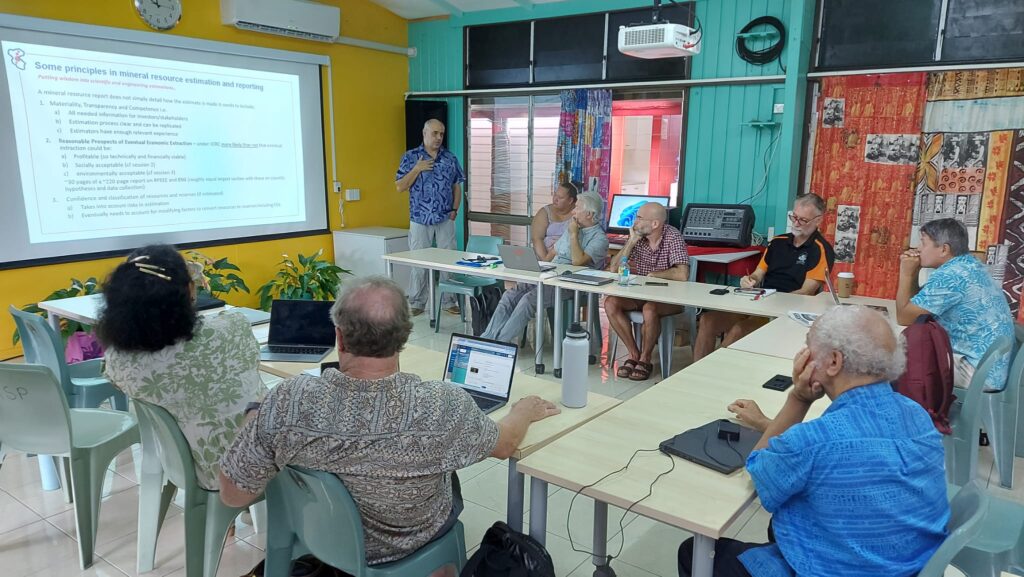
Pacific Islands Universities Research Network Conference
Between 4-6 July, JTPac’s Nick Bainton, Emilka Skrzypek and Pierre-Yves Le Meur attended the 5th Pacific Islands Universities Research Network Conference in Rarotonga, Cook Islands. The theme of this year’s meeting was: ‘Exploring this Sea of Islands’. The conference provided an opportunity to discuss global energy transitions and justice convergences in the Pacific with a range of Pacific researchers and scholars. How can the people and nations of the Pacific manage double exposure to resource extraction and climate change? How can social science research help understand and manage these double pressures in the Pacific?
You can find out more about PIURN and the conference here: Exploring this sea of islands: 5th Pacific Islands Universities Network Conference – Sciencesconf.org
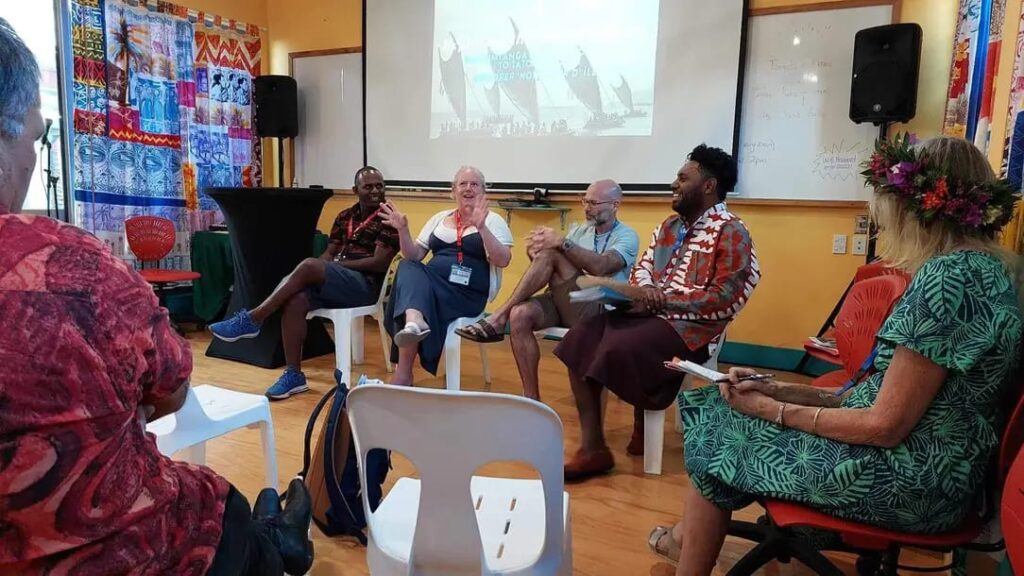
Gottingen’s Institutskolloquium Ethnologie
On the 1st June 2023, Emilka Skrzypek and Nick Bainton were invited to present JTPac’s work at the University of Gottingen’s Institutskolloquium Ethnologie. The seminar presentation provided an overview of the JTPac project, but also served to open up a wider conversation about extractivism in the Pacific, under conditions of climate change.
‘Conversations and scholarly debates about climate change and extractivism in the Pacific are well established, each in its own right. Our work brings them together in an exploration of the relationship between these two global forces. We are interested in learning more about how Pacific people and nations are dealing with this form of double exposure: how exposure to climate change and extractive capitalism manifests, how it is experienced, the types of responses that have emerged, potential policy blind spots, and the disconnect between strategies to achieve economic development on the one hand and strategies to combat the worst effects of climate change on the other. ‘
You can find out more about the IGöttingen Institute of Social and Cultural Anthropology here: Institut für Ethnologie & Ethnologische Sammlung Göttingen | Göttingen Institute of Social and Cultural Anthropology (GISCA) (wordpress.com)
Dealing with Double Exposure – working session at the ASAO meeting in February 2023
Continuing their exploration of the complex relationship between extractive capitalism and climate change in the Pacific, Emilka Skrzypek and Nick Bainton convened a working session at the Association for Social Anthropologists of Oceania annual meeting in Kona, Hawai’I (1-4 February 2023). The session explored how the pressures of extractive capitalism experienced across the region shape the ways in which communities, governments, and other actors respond to and act on climate change – and how climate change necessitates or justifies new patterns of extraction. And how are people and communities in the Pacific experience and deal with this peculiar form of double exposure? During the session we heard from:
- Emilka Skrzypek & Nick Bainton: Double Exposure in the Pacific: Climate Change and the Energy-Extractives nexus
- Jamon Halvaksz: The Dry Season of Mining Labour
- Michael Main: Shifting the Sands: Using Climate Change to Leverage the Social License to Operate
- Tobias Schwörer: Energy Transitions in Papua New Guinea: The Intersections of Mining, Plantations and Local Inequalities in the Markham Valley Energyscape
- Foley C. Pfalzgraf : “Fixing” the Forest in Vanuatu: The (re)Making of Forests in search of Finance
- Vehia Wheeler : Capitalism from the Inside and Out: Climate Change and Industrialized Fishing in Mâ’ohi Nui
- Miriam Ladstein: Standing on the alofi: civil society guardianship of the local in multi-scalar spaces in Fiji
- Edvard Hviding: Adjacency, Connectivity, and Benefit-Sharing: Frontlines of Oceania in United Nations Ocean Diplomacy
We also benefited from insightful comments and questions from numerous members of the audience, which greatly enriched the conversation on the day.
You can find full session detail here: Program – Association for Social Anthropology in Oceania (asao.org)
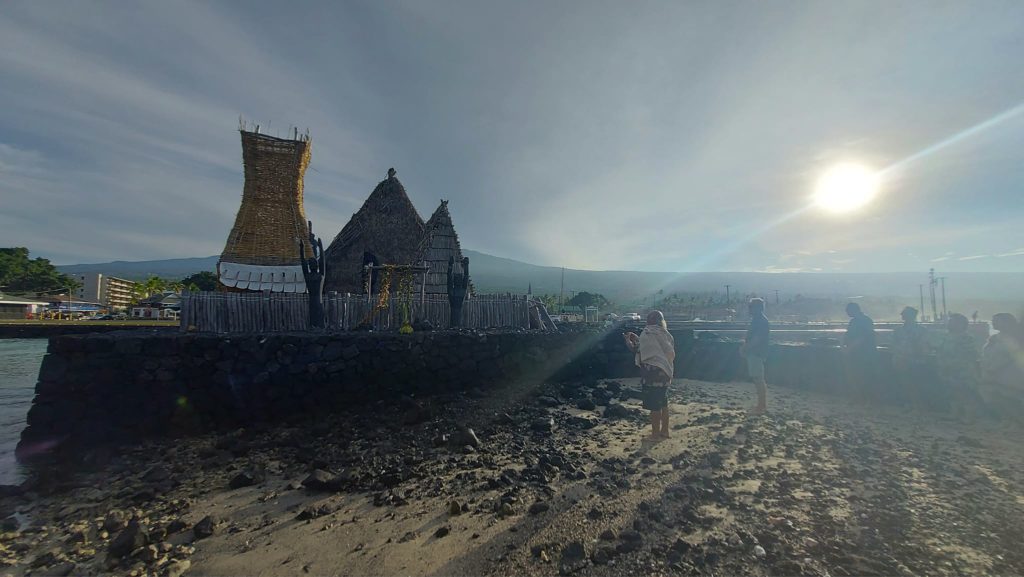
UN Pacific Forum panel on Resource Extraction and Climate Change in the Pacific – 22nd November 2022
Nick Bainton hosted a panel session on Responsible business conduct in the extractive and minerals sector. The session took place at the UN Pacific Forum on Business and Human Rights on Tuesday, November 22nd in Suva, Fiji.
Speakers at the panel were: Mr Marcos A. Orellana, Special Rapporteur on toxics and human rights; Ms Keren Adams, Human Rights Law Centre; and Mr Darren Grant, Country Manager, Dome Gold Mines Ltd.
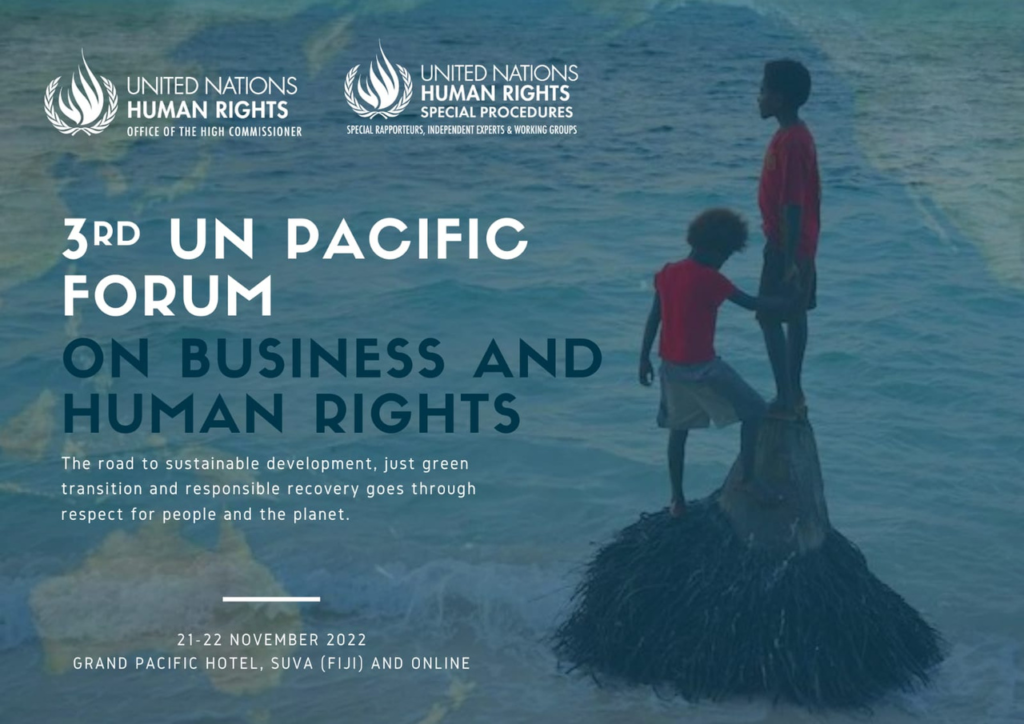
The Pacific Centre for Social Responsibility and Natural Resources workshop – November 2022
Following up on discussions started in New Caledonia in June 2022, JTPac’s Nick Bainton hosted a follow up meeting of the Pacific Centre for Social Responsibility and Natural Resources (PACSEN) at the University of Queensland in Brisbane.
JTPac’s Nick Bainton, Emilka Skrzypek and John Burton came together with researchers from the French Institute for Resource Development [IRD], and the Massey University in New Zealand to consider: what would a research framework capable of exploring the relationship between global energy transitions, climate change and resource extraction in the Pacific look like?
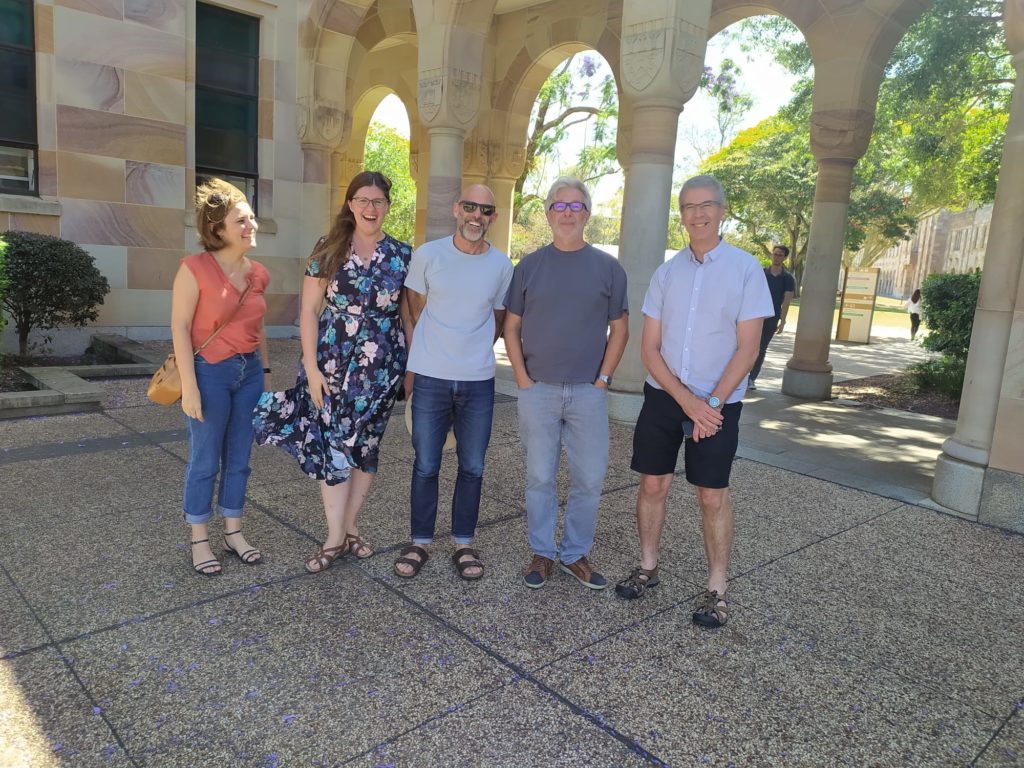
The Pacific Centre for Social Responsibility and Natural Resources workshop – June 2022
In the last week of June, JTPac’s Nick Bainton, Emilka Skrzypek and John Burton travelled to Pouembout in New Caledonia to take part in a workshop organised by the Pacific Centre for Social Responsibility and Natural Resources (PACSEN). The workshop brought together researchers from New Caledonia, Fiji, Papua New Guinea and Australia in a series of critical conversations about management of natural resources in the Pacific.
In what ways can responsible and sustainable management of natural resources strengthen the region and improve the wellbeing of the Pacific communities? What are some of the risks and opportunities associated with utilisation of Pacific’s natural resources? And how will those be impacted by the dynamics of global energy transitions, and climate change?
The diversity of experiences and expertise present in the workshop demonstrated very clearly that addressing these questions will require a high level of collaboration between disciplines, sectors and countries.
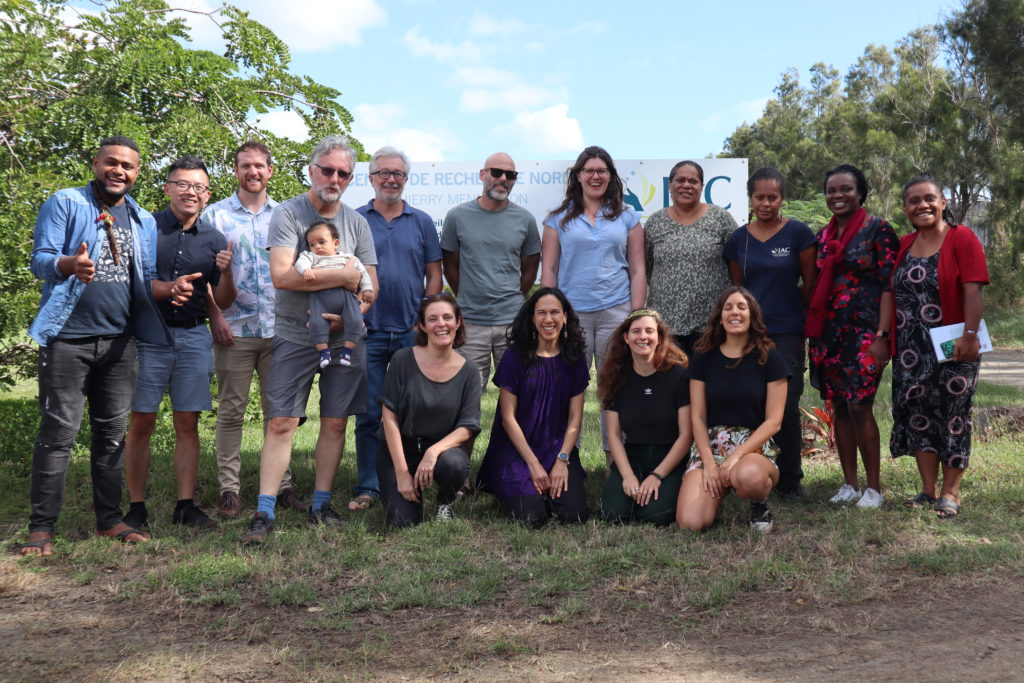
ESfO Conference Panel – June 2022
Emilka Skrzypek and Nick Bainton convened a panel titled Dealing with Double Exposure: Global Energy Transitions, Climate Change and Resource Extraction in the Pacific at the European Society for Oceanists’ conference in Ajaccio, Corsica, 2-6 June 2022.
The Pacific is at the frontline of a ‘double exposure’ to climate change and the consequences of economic globalisation. The panel explored ways in which Pacific peoples and nations experience and navigate the challenges of the double exposure and considers justice issues arising in the Pacific from increased resource extraction under conditions of climate change. We heard from:
- Emilka Skrzypek: Global energy transitions and justice convergences in the Pacific
- Jerry Jacka: Resource extraction and climate change in Papua New Guinea: the role of the Pacific in planetary phenomena
- Tobias Shwoerer: Energy transitions in Papua New Guinea: mining, biomass plantations and local inequalities in the Markham valley
- Norbert Pötzsch: Tongas environmental dilemma? Challenges of climate change and the increase of cars
- Martino Miceli: Waiting for the day after: Energy transition and late-industrial disconnections in Nickeltown (Thio/ Cöö, Kanaky/ New Caledonia)
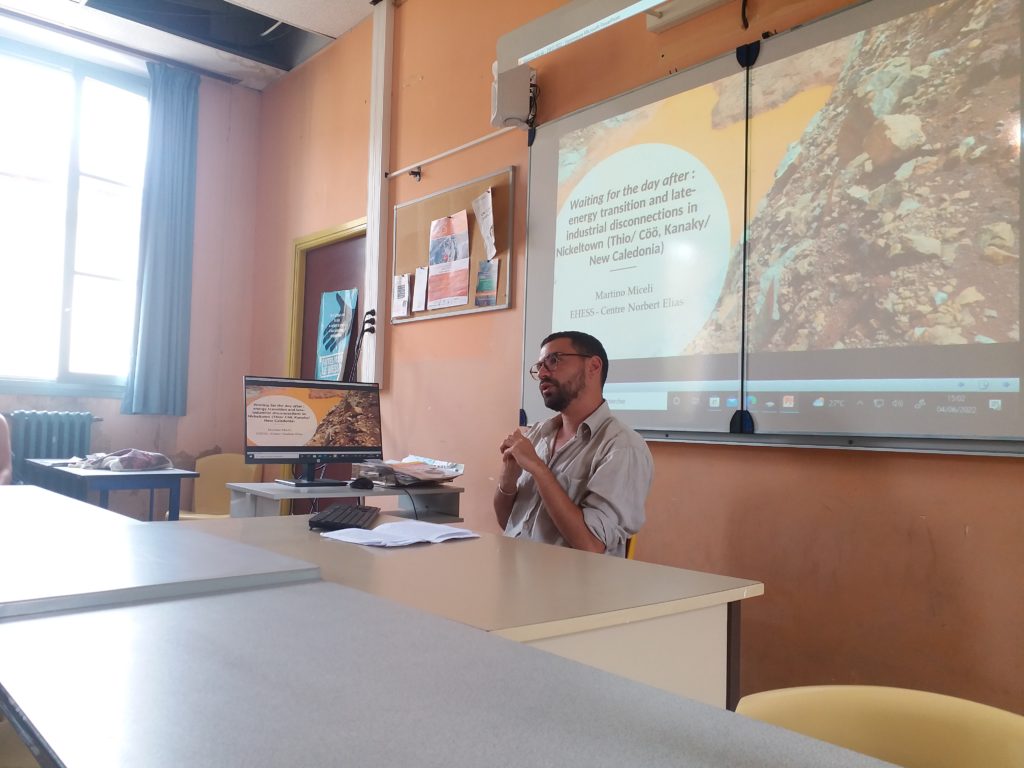
Book Launch
Nick Bainton and Emilka Skrzypek were very pleased to finally launch their new book The Absent Presence of the State in Large-Scale Resource Extraction Projects. On 8th December, the Centre for Energy Ethics at the University of St Andrews hosted a virtual launch, providing an excellent opportunity to showcase the book and discuss how the concept of ‘absent presence’ can contribute to anthropological understandings of state and extractive capitalism. Published open access with ANU Press, you can download copies of the book here
Contributing authors recorded short two-minute videos explaining how they worked with the absent presence concept and the sorts of ethnographic insights yielded through this lens. You can view the video here
Their ‘absent presence’ project also revealed itself as another critical platform for thinking about the justice issues tied to global energy transitions. As we consider the sorts of pressures and risks associated with increased extraction of critical metals in the Pacific, the state is clearly central to any future extractive scenarios. For example, will Pacific states be more present for extractive companies and their interests, or selectively absent when it comes to supporting local communities and upholding environmental responsibilities? How we conceptualise the state in the context of growing demand for critical metals under conditions of climate change is essential for understanding why certain justice issues arise and what can be done about them.
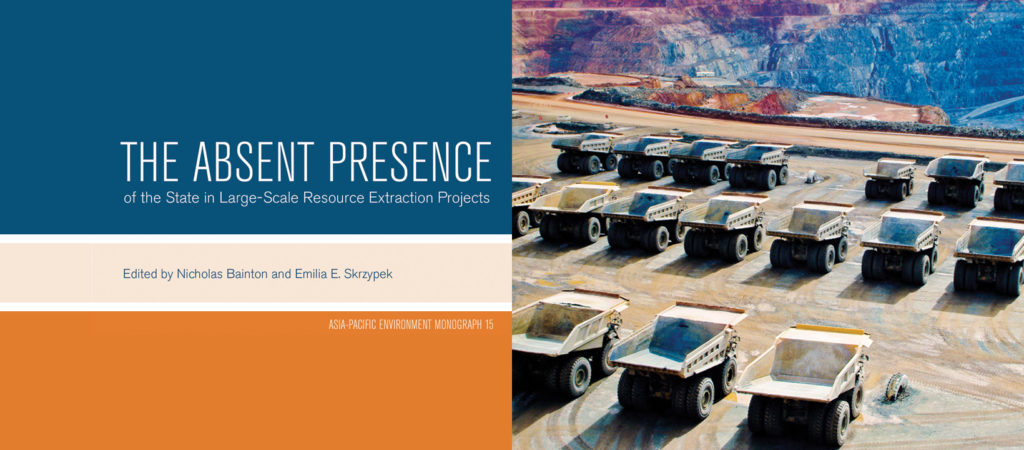
UN Pacific Forum panel on Resource Extraction and Climate Change in the Pacific – 23rd November 2021
Nick Bainton will host a panel session on Resource Extraction and Climate Change in the Pacific: Double Exposure. The session will take place at the UN Pacific Forum on Business and Human Rights on Tuesday, November 23rd. The event will be streamed online and everyone is welcome to attend.
Nick will be joined by his guests: Alex Herman, Robyn James and Joel Hamago. This session will consider the human rights consequences of increased resource extraction under conditions of climate change in the Pacific. Speakers will consider these future pressures from three different perspectives: governance, community, and industry. For more details and to register go to: https://2unpacificforumbhr.sched.com/event/q6bz
You can now watch a recording of this session here: https://www.youtube.com/watch?v=AYf8mi37k50